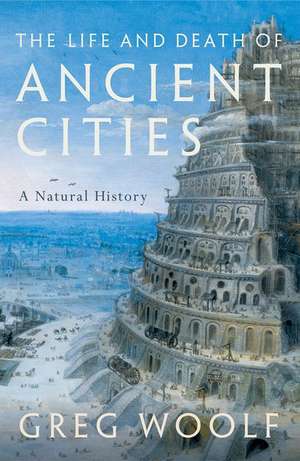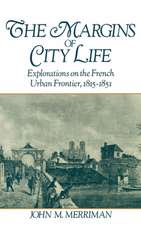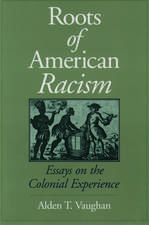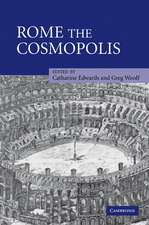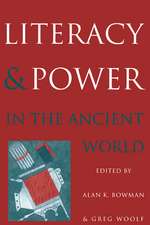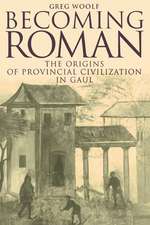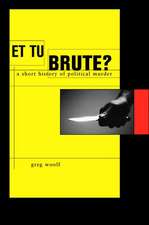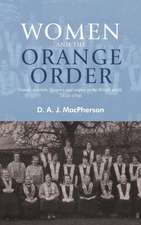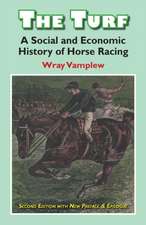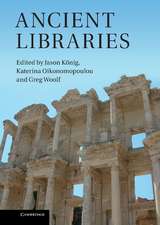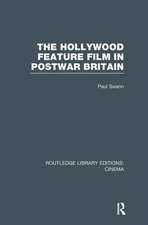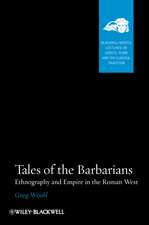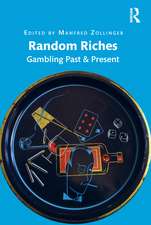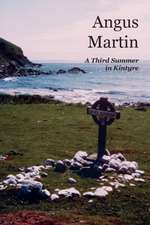The Life and Death of Ancient Cities: A Natural History
Autor Greg Woolfen Limba Engleză Paperback – 25 aug 2022
| Toate formatele și edițiile | Preț | Express |
|---|---|---|
| Paperback (2) | 120.39 lei 10-16 zile | +44.11 lei 7-13 zile |
| OUP OXFORD – 25 aug 2022 | 120.39 lei 10-16 zile | +44.11 lei 7-13 zile |
| HURST & CO – 26 aug 2022 | 177.65 lei 3-5 săpt. | |
| Hardback (2) | 180.99 lei 10-16 zile | +67.88 lei 7-13 zile |
| OUP OXFORD – 16 iul 2020 | 180.99 lei 10-16 zile | +67.88 lei 7-13 zile |
| HURST & CO – iul 2020 | 246.32 lei 3-5 săpt. |
Preț: 120.39 lei
Preț vechi: 143.18 lei
-16% Nou
Puncte Express: 181
Preț estimativ în valută:
23.04€ • 23.92$ • 19.21£
23.04€ • 23.92$ • 19.21£
Carte disponibilă
Livrare economică 18-24 februarie
Livrare express 15-21 februarie pentru 54.10 lei
Preluare comenzi: 021 569.72.76
Specificații
ISBN-13: 9780199664740
ISBN-10: 0199664749
Pagini: 528
Ilustrații: 44
Dimensiuni: 135 x 215 x 40 mm
Greutate: 0.52 kg
Editura: OUP OXFORD
Colecția OUP Oxford
Locul publicării:Oxford, United Kingdom
ISBN-10: 0199664749
Pagini: 528
Ilustrații: 44
Dimensiuni: 135 x 215 x 40 mm
Greutate: 0.52 kg
Editura: OUP OXFORD
Colecția OUP Oxford
Locul publicării:Oxford, United Kingdom
Recenzii
Selected as a 2020 Book of the Year in The Times Literary Supplement
A magisterial survey of ancient cities... "The Life and Death of Ancient Cities" is a big history that leaves aside some of those big comparative questions, preferring to draw out the contingent and the particular in its vivid portraits. Mr. Woolf makes for an authoritative, readable and thought-provoking guide through a few thousand years of our life as urban animals.
Fascinating and challenging... an impressive sweep of a book.
Greg Woolf reminds us of how vulnerable urban life has often been to plague, invasion and economic collapse.
As I hope will be obvious, this is ever such a good book. Woolf has an enviable knack for getting across complex ideas in a deft and stylish way, without any sacrifice of precision... Whatever one thinks of the evolutionary underpinning of life and death, no one has ever made a more compelling case for seeing cities as part of the natural history of our species.
A general history that manages to escape both the superficiality and the cretinous populism to which the genre is prone... From hydraulic despotism as the driver of urbanism to civilisation-ending vulcanism at Santorini, Woolf dismembers a lot of sacred cows. And, in a surely conscious paradox, he ventures a master hypothesis of his own: an evolutionary approach to urbanism. We are, Woolf contends, urban apes.
An impressive overview of trends in urban histories and will have an impact outside the field of archaeology and ancient history, underlining the centrality of these disciplines to the humanities and social sciences in general, as well as to a wider audience. It is certainly worth the long read to let oneself be carried through urban moments from the Levantine and Mediterranean prehistory into Late Antiquity and beyond. It is a hugely enjoyable read that reminds us that cities and settlements are creations of, and tools for, humans, creating possibilities and unforeseen hindrances in our lives.
This is a fine single-volume study of the ebb and flow of the European civilisations that built cities both large and small.
If you have any interest in its subject, you won't regret the investment of time and money.
Greg Woolf is a lively and learned guide to ancient cities... Woolf's book contains many brilliant insights and is a major contribution to the history of the Mediterranean.
A deeply researched and ambitious "natural history" of the origins and growth of urbanism.
An engaging and comprehensive read... Woolf provides an interesting discussion on how humans are suited to city life, and also offers some thought-provoking considerations on the current rate of globalisation that we're experiencing today This book should appeal to those who want to discover another perspective on the history of the Mediterranean or, indeed, the ancient world.
Woolf's The Life and Death of Ancient Cities: A Natural History is an engaging and richly detailed account that effectively tears down misconceptions about the ancient city and replaces them with a more diverse, more believable, and, ultimately, more interesting tale of kaleidoscopic urban experimentation across the ancient Mediterranean world.
This worthy book contains multitudes, and as interesting and certainly as instructive as Professor Woolf's studies of urbanization are the not-few cases of deurbanization that he is able to explore, most conspicuously the (possible causes of the) decline or rather transformation of the late Roman antique world.
This is a first-class publication that threads its way seamlessly through a complex topic across vast regions and time-spans. It is also accessibly written and highly recommended.
This is an important study which should stand alongside the tours de force of Fernand Braudel and David Abulafia.
The Life and Death of Ancient Cities joins a shelf full of enlightening new fun reads on understanding our beginnings in the ancient world.
The enormous scope of this book is impressive, and with his resolute 'focus' on ecological circumstances Woolf shifts the focus to make us reconsider the role of urbanism in Antiquity.
A magisterial survey of ancient cities... "The Life and Death of Ancient Cities" is a big history that leaves aside some of those big comparative questions, preferring to draw out the contingent and the particular in its vivid portraits. Mr. Woolf makes for an authoritative, readable and thought-provoking guide through a few thousand years of our life as urban animals.
Fascinating and challenging... an impressive sweep of a book.
Greg Woolf reminds us of how vulnerable urban life has often been to plague, invasion and economic collapse.
As I hope will be obvious, this is ever such a good book. Woolf has an enviable knack for getting across complex ideas in a deft and stylish way, without any sacrifice of precision... Whatever one thinks of the evolutionary underpinning of life and death, no one has ever made a more compelling case for seeing cities as part of the natural history of our species.
A general history that manages to escape both the superficiality and the cretinous populism to which the genre is prone... From hydraulic despotism as the driver of urbanism to civilisation-ending vulcanism at Santorini, Woolf dismembers a lot of sacred cows. And, in a surely conscious paradox, he ventures a master hypothesis of his own: an evolutionary approach to urbanism. We are, Woolf contends, urban apes.
An impressive overview of trends in urban histories and will have an impact outside the field of archaeology and ancient history, underlining the centrality of these disciplines to the humanities and social sciences in general, as well as to a wider audience. It is certainly worth the long read to let oneself be carried through urban moments from the Levantine and Mediterranean prehistory into Late Antiquity and beyond. It is a hugely enjoyable read that reminds us that cities and settlements are creations of, and tools for, humans, creating possibilities and unforeseen hindrances in our lives.
This is a fine single-volume study of the ebb and flow of the European civilisations that built cities both large and small.
If you have any interest in its subject, you won't regret the investment of time and money.
Greg Woolf is a lively and learned guide to ancient cities... Woolf's book contains many brilliant insights and is a major contribution to the history of the Mediterranean.
A deeply researched and ambitious "natural history" of the origins and growth of urbanism.
An engaging and comprehensive read... Woolf provides an interesting discussion on how humans are suited to city life, and also offers some thought-provoking considerations on the current rate of globalisation that we're experiencing today This book should appeal to those who want to discover another perspective on the history of the Mediterranean or, indeed, the ancient world.
Woolf's The Life and Death of Ancient Cities: A Natural History is an engaging and richly detailed account that effectively tears down misconceptions about the ancient city and replaces them with a more diverse, more believable, and, ultimately, more interesting tale of kaleidoscopic urban experimentation across the ancient Mediterranean world.
This worthy book contains multitudes, and as interesting and certainly as instructive as Professor Woolf's studies of urbanization are the not-few cases of deurbanization that he is able to explore, most conspicuously the (possible causes of the) decline or rather transformation of the late Roman antique world.
This is a first-class publication that threads its way seamlessly through a complex topic across vast regions and time-spans. It is also accessibly written and highly recommended.
This is an important study which should stand alongside the tours de force of Fernand Braudel and David Abulafia.
The Life and Death of Ancient Cities joins a shelf full of enlightening new fun reads on understanding our beginnings in the ancient world.
The enormous scope of this book is impressive, and with his resolute 'focus' on ecological circumstances Woolf shifts the focus to make us reconsider the role of urbanism in Antiquity.
Notă biografică
Greg Woolf has been Professor of Classics and Director of the Institute of Classical Studies since January 2015 before which he was Professor of Ancient History at the University of St Andrews (since 1998) and held fellowships at various Cambridge and Oxford Colleges. He has degrees from both Oxford and Cambridge, is a Fellow of the British Academy, of the Society of Antiquaries of Scotland, of the Society of Antiquaries of London and of the Max Weber College, Erfurt and he is a member of the Academia Europaea. He has held visiting appointments in Brasil, France, Germany, Italy and Spain and lectured around the world. He has published on Roman imperialism, on ancient literacy, on libraries, encyclopaedias and ancient ethnography and more recently on religious history and the archaeology of the Roman world.
